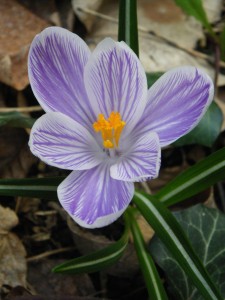 March 30, 2010
March 30, 2010
Spring is in the air and hopefully, you are not suffering from a spring cold. Or allergies. This morning on, “Good Morning America,” Dr. Besser talked about health information and social media–offering cautions about ‘advice’ that might appear on Facebook or other outlets, or health information sent via tweets.
After offering the general advice to be careful about what we believe, he focused on an example relating to the use of an herb to fight a cold. He made the statement I used in the title for this post: “There is no evidence that herbs work for a cold.” O.K. What’s wrong with that statement?
From a health communication perspective, this kind of comment is made often. If Dr. Besser or another source of the comment is someone we trust and believe to be an expert, we may accept the comment without further thought. We are usually not expert in health. Not surprisingly, we look to experts in health to guide our understanding.
But here is the problem I have with such statements. They do nothing to help us become more competent in making decisions for ourselves about health information. Dr. Besser could explain that there is no evidence and also explain what he means by evidence. For him, evidence = scientific data. Those numbers are usually the result of carefully conducted clinical trials. Those carefully conducted clinical trials cost — well a lot of money. And relatively few dollars are spent on research to study complementary and alternative medical practices–such as the use of herbs to fight colds.
The traditional approaches to health in the U.S. are prescription and over-the-counter drugs, and surgery, and the use of medical devices–many device relate to surgery and others that boost some of our ability to manage our own health. There are many expensive funded studies to evaluate the effects of these approaches. Based on the results, evidence is published and then disseminated to guide our doctors’ knowledge and our care.
We should realize that the research by pharmaceutical companies sometimes looks at herbs and works to understand how they might work to help or harm human health. Finding that an herb works may lead the drug company to produce synthetic versions of the herb and conduct research to see how they work. After all, we and our doctors do not live in the era of Dr. Quinn, Medicine Woman and cannot go into nearby woods to pick herbs to make teas or other potions to heal us. Medicine generally needs products that can be sold in mass quantities.
So, what does a lack of evidence mean when it comes to Dr. Besser’s statement? It means that no scientific clinical trials have shown the use of the ‘natural’ herb to be effective in reducing the effects of a cold.
Dr. Besser’s statment is not considering that your friend, your neighbor, or a thousand friends and neighbors on a social media site have used the herb and tell their stories about how it worked for them. It is not addressing the fact that we often trust the stories of others as ‘evidence.’ But it is not the same kind of evidence as science would provide. That is something he did not say. From a health communication perspective, we want to know this to help us better understand health information.
He also did not say whether the herb being promoted for a cold is one that drug companies may have or may be studying in some form. From a health communication perspective, we also want to know this to help us better understand health information…
